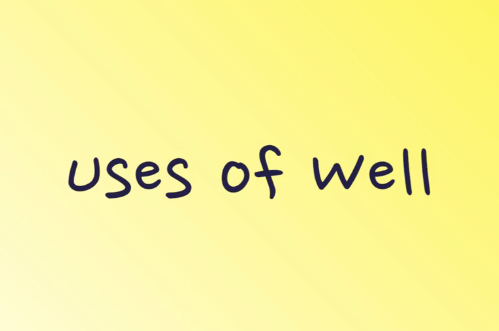(单词翻译:单击)
Lucija, let me know when we start filming.
露茜佳,开始拍摄时通知我一声。
I think we already started. I see the red light is on.
我想我们已经开始了。我看到红灯是亮着的。
Well, this is awkward.
行吧,真是尴尬。
This is Everyday Grammar. I'm Kaveh.
这里是《每日语法》节目。我是卡韦赫。
And I'm Lucija. Today we're talking about the common adverb "well".
我是露茜佳。今天我们要聊一聊well这个常见的副词。
Well, let's go for it.
好,我们开始吧。
"Well" can have three different meanings.
Well有三种不同的含义。
The first is to show contrast or disagreement.
第一种是表达分歧或者反对。
I can't believe I missed the meeting.
不敢相信我竟然错过了会议。
Well, I did tell you it started at 8 sharp.
行吧,可是我之前就告诉你8点整开始啊。
I failed my test.
我考试没及格。
Well, you would have gotten a better grade if you studied.
行吧,可如果你学习了的话,成绩会比现在好得多。

The second use of "well" is to show uncertainty, especially in answers.
well的第二种用法是表达不确定,尤其是在答句中。
Are you free on Friday?
你周五有空吗?
Well, I'm supposed to have dinner with friends.
恩...我应该会和朋友们一起吃晚饭。
In this example, the second speaker is slow to respond, because they are unsure if they have plans on Friday.
在这个例子中,第二个说话人答复得很慢,因为他们不确定周五是否有安排。
The speaker is supposed to have dinner, but it is possible it was not yet confirmed,
说话人应该会去吃晚饭,但可能还没有最终确认,
and they do not know if they have free time.
所以他们不知道是否有时间。
And the third use of "well" is to show a conversation is ending.
well的第三种用法是表达一个对话的结束。
For example, if you meet an old friend on the street, and after a couple of minutes they say,
比如说,如果你在街上见到了一位老朋友,过了一会儿会这么说,
"Well, it was nice running into you."
“恩,很高兴遇见你。”
It indicates that the friend wants to end the conversation soon.
这就暗示,这位朋友想尽快结束这次谈话。
Lucija, in American culture, that's an indirect way of ending a conversation, right?
露茜佳,在美国文化当中,这是一种委婉的结束对话的方式,是吧?
Yes, it is! Well, this was fun.
没错!恩,还挺有意思的。
And that's Everyday Grammar.
以上就是本期的《每日语法》。


